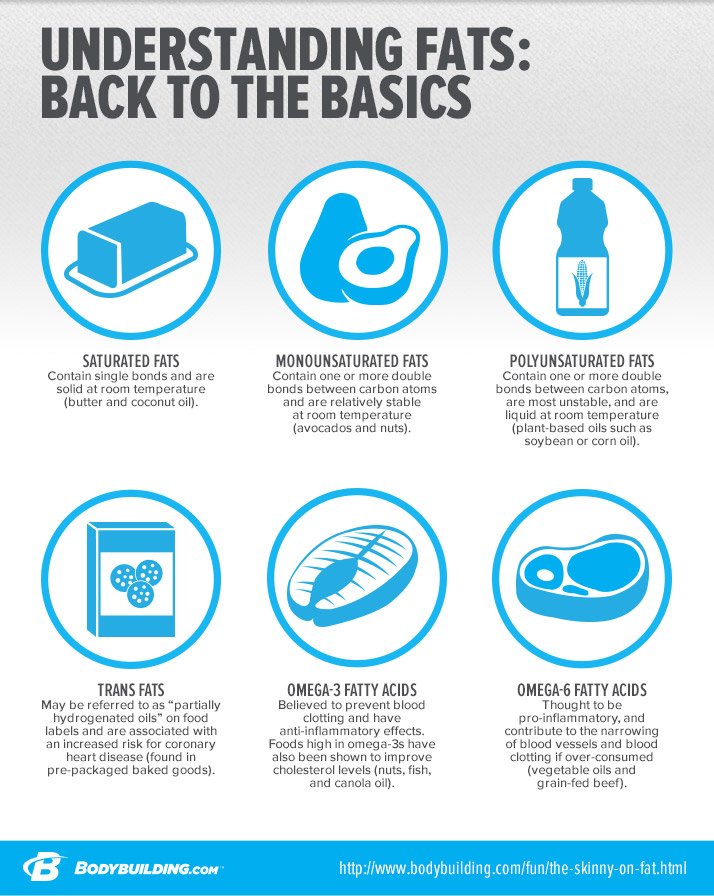Fat is an essential macronutrient for optimal health and well-being. It's what every cell membrane in our body is made of and helps to regulate many hormonal and anatomical processes. But it's also a calorie-dense source of fuel, and knowing how to factor fatty foods into your diet is essential for achieving your goals of muscle gain or weight loss.
Use this calculator to help you determine your ideal fat intake based on your sex, height, weight, activity level, and fitness goal!
FAT INTAKE CALCULATOR
Alongside an appropriate number of calories and protein, this daily fat target can help you lose weight while staying healthy and feeling great. Here are the next steps on your weight-loss journey:
1. Pick a weight-loss workout plan.
A well-designed program is an essential part of turning hard numbers into hard-body results!
2. Calculate your macros.
Fats are just one of the three macronutrients. To get targets for the other two, as well as a daily calorie target, use the Bodybuilding.com Macronutrient Calculator.
3. Learn about the best fat-loss supplements.
Supplements can help you accelerate your results once you have your macronutrients and training in place. Krissy Kendall, Ph.D., shares her recommendations in the article, "5 Ways to Up Your Fat-Loss Supplement Game."
4. Join a fitness community.
For over 10 years, members of BodySpace have been helping each other build their best bodies. Join a fitness community that's over 2 million people strong!
Alongside adequate calories and protein, this daily fats target can help you build lean muscle mass and support your hard training. Here are the next steps on your journey to see the scale go up:
1. Pick a muscle-building workout plan.
A well-designed program is an essential part of turning hard numbers into hard-body results!
2. Calculate your macros.
Fats are just one of the three macronutrients. To get targets for the other two, as well as a daily calorie target, use the Bodybuilding.com Macronutrient Calculator.
3. Learn about the best supplements for gaining muscle.
Supplements can help you accelerate your muscle-building results once you have your macronutrients and training dialed in. Krissy Kendall, Ph.D., shares her recommendations in the article, "8 Proven Supplements for Muscle Growth and Strength."
4. Join a fitness community.
For over 10 years, members of BodySpace have been helping each other build their best bodies. Join a fitness community that's over 2 million people strong!
1. Pick a workout plan.
A well-designed program is an essential part of staying motivated and seeing results.
2. Calculate your macros.
Fats are just one of the three macronutrients. To get targets for the other two, as well as a daily calorie target, use the Bodybuilding.com Macronutrient Calculator.
3. Learn about the best health-focused supplements.
Supplements can help you accelerate your results and support your training once you have your protein target and training in place. Chris Lockwood, Ph.D., shares what to take and why in the article, "Start Here: The Most Important Supplements for Every Body."
4. Join a fitness community.
For over 10 years, members of BodySpace have been helping each other build their best bodies. Join a fitness community that's over 2 million people strong!
HOW DID WE CALCULATE YOUR RECOMMENDED FAT INTAKE?
Bodybuilding.com's macro calculator starts with the Mifflin St. Jeor equation, which is considered by our nutritionists and dieticians to be the "gold standard" of calorie calculators. Here's how it works:
Calculate basal metabolic rate (BMR), or the calories your body burns simply by being alive.
For men: 10 x weight (kg) + 6.25 x height (cm) – 5 x age (y) + 5 (kcal / day)
For women: 10 x weight (kg) + 6.25 x height (cm) – 5 x age (y) -161 (kcal / day)
Then, this BMR count is multiplied, depending on your activity level:
Sedentary = 1.2
Lightly active = 1.375
Moderately active = 1.550
Very active = 1.725
Extra active = 1.9
The calorie count is then adjusted based on your goal:
Weight loss: Reduce by 10-20%
Weight gain: Add 500 calories
Weight maintenance: Unchanged
This calorie count is split into macronutrient percentages in the following ratios, based on splits commonly recommended by our nutrition experts for muscle gain, weight loss, and weight maintenance. (Yes, weight gain and maintenance are the same ratio, but the calories and macros are different.)
Weight loss: 40/40/20 (carbohydrates/protein/fats)
Weight gain: 40/30/30
Weight maintenance: 40/30/30
Your fat intake comes from applying those percentages to your daily calorie number. For example, if you are on a 2,000 calorie maintenance diet, 600 of those calories would come from fat, because 30 percent of 2,000 is 600. Each gram of fat is "worth" 9 calories, so to calculate your total grams of fat, divide those fat calories by 9. In this example, you'd be able to eat 67 grams of fat each day.
If you'd like to see your complete macros rather than just fats, use our full macro calculator.
HOW MUCH FAT IS IN MY FOOD?
You can calculate this using food labels, as well as by weighing out your food on a food scale and using one of the many online nutritional databases.
Weighing food may seem like a lot of counting and not much fun, but it gets easier over time. Fitness coach Vince Del Monte says that you quickly learn to "eyeball" quantities of both calories and macronutrients after just a few weeks of practice.
WILL EATING FAT MAKE ME FAT?
No! The fats you eat do not automatically become fat deposits on your body, also known as adipose tissue. In fact the low-fat trend of the late 20th century did very little to curb the obesity epidemic and the rise in heart disease and diabetes among Americans.
The truth is, not only do you need to eat fat as part of a healthy diet to manufacture critical hormones and cell membranes, daily fat intake is also crucial for your body to be able to absorb key nutrients, such as fat-soluble vitamins like E and K.
Registered dietician Douglas Kalman, Ph.D., explains why you need dietary fats and how to navigate the "good fat/bad fat" narrative in the video, "Fats: Seeing Through the Mixed Messages" from the BodyFit course Foundations of Fitness Nutrition.
WHAT TYPES OF FATS SHOULD I EAT?
Fat isn't just fat. What type you eat matters!
Unsaturated fats include both the monounsaturated fats found in high-fat foods like avocados and nuts, and the polyunsaturated fats found in soybean and corn oil. Saturated fats tend to be solid at room temperature and include things like butter and coconut oil. Since both unsaturated fats and saturated fats can be found in natural plant sources, you're likely to have some of both in your diet. And as Fairman explains, all three varieties are essential for different reasons.

Fairman recommends dedicating around 10 percent of your daily intake to saturated fats, and the rest from unsaturated fats or omega-3 fatty acids.


